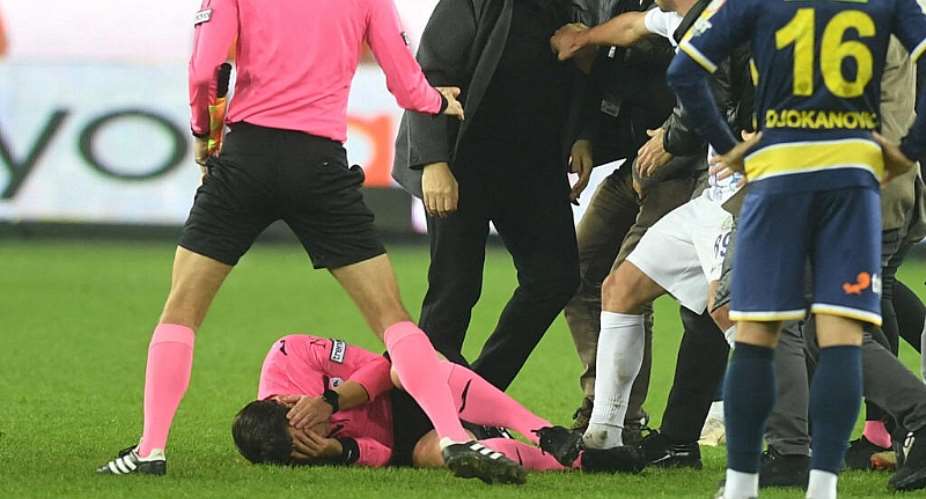The assault of a referee at a Turkish professional football match has drawn international condemnation and the unprecedented suspension of all league games. But it's also brought into focus the wider spectre of violence against public officials in Turkish society, which some blame on the polarising politics of President Recep Tayyip Erdogan.
After a week-long suspension, Turkish football supporters returned to the stadiums a few days ago.
Play had been suspended for a week after a referee was punched and then kicked on the ground by senior club officials of a major league team.
Halil Umut Meler, who often referees international games, was hospitalised in the incident, which drew worldwide condemnation.
But the assault also brought into focus the growing violence faced by many public professionals in Turkey.
In a video circulating on social media, doctors ask why they are the target of assaults, a problem medical professionals say is increasingly urgent.
The Turkish Physicians' Association claims there has been a 600 percent rise in violent attacks over the past decade.
Healthcare staff have been protesting for more than a year over rising casualties within their profession and what they claim is government indifference.
"Lots of doctors are dying. Also, lots of nurses are dying in our country," said Berkay Unlu, a doctor at a state hospital in Izmir.
"No one cares about that," he said, exasperated. "It's so important; we are doctors, we are just working for our public."
Political gulf
According to unions, schools are also witnessing a similar surge in violence against staff.
Some analysts say it's symptomatic of a growing gulf in Turkish society, fuelled by years of populist politics driven by President Recep Tayyip Erdogan and his AK Party, whose voting base is poor and religiously conservative.
Erdogan often accuses the elite of undermining his rule – most recently, academics drew his fire.
"What Erdogan and the AK Party are propagating is that they're representing the real people. So they're coming from the grassroots, and they're representing the true native culture of Turkey," explains Sezin Oney , a commentator for the PolitikYol news portal.
"Then you have the opposition, who are the traitors, the elite, the people who are to be castigated – and this polarisation always works because that gives the idea that they are the majority," she says.
"And you have a minority which can be just bashed, stepped upon."
Scapegoats
Erdogan's government rejects such claims, insisting it has introduced increased legal protection for doctors and other professionals.
But critics say such measures aren't being enforced.
With the country facing growing economic woes that are impacting services, professionals claim they are becoming the scapegoats for growing public anger.
"They don't see the real reasons for their problems and target the health professionals instead of the system, so violence escalated," warns Doctor Sebnem Korur Fincanci, chair of the Turkish Medical Association and a renowned human rights activist, who has herself faced legal woes under Erdogan.
"The frustration, unfortunately, was just reflected towards health professionals instead of the government."
Brain drain
The growing violence is leading to an exodus of professionals from Turkey.
"I think it's a big problem because it's first leading to brain drain – these are highly educated individuals who have a certain expertise and a certain profession that they can practice elsewhere," says analyst Oney.
"When you have a deficit of health workers, doctors and teachers, there is deterioration in the health system. There is deterioration in the education system," she says, warning that Turkey is facing a vicious circle.
"This is, of course, causing social crisis after social crisis. It's going to be a much unhappier, much more discontented society. And this leads to more violence."
The beating of Meler, one of Turkey's highest-profile referees, has become a symbol of the dangers faced by many professionals who serve the public – and the wider risks of the deepening polarisation in Turkish society.





 Land disputes: We must strictly enforce land tenure, administrative laws—Securit...
Land disputes: We must strictly enforce land tenure, administrative laws—Securit...
 V/R: Keta NMTC appeals for support to fix damaged auditorium
V/R: Keta NMTC appeals for support to fix damaged auditorium
 Eugene Arhin is a blessing to us — Awutu Senya DCE
Eugene Arhin is a blessing to us — Awutu Senya DCE
 Confusion in NPP Walewale
Confusion in NPP Walewale
 Chieftaincy disputes becoming national security threats — Albert Kan-Dapaah
Chieftaincy disputes becoming national security threats — Albert Kan-Dapaah
 Exchange of old cylinders for new ones under CRM to begin soon — NPA
Exchange of old cylinders for new ones under CRM to begin soon — NPA
 Cocoa Farmers Association urges Akufo-Addo to disregard allegations against COCO...
Cocoa Farmers Association urges Akufo-Addo to disregard allegations against COCO...
 WN/R: Papaase residents kick against alleged plans to mine on River Kantango
WN/R: Papaase residents kick against alleged plans to mine on River Kantango
 CDD-Ghana criticises govt handling of Cecilia Dapaah’s money laundering case
CDD-Ghana criticises govt handling of Cecilia Dapaah’s money laundering case
 Ghana will not derail into political turmoil under my watch — Akufo-Addo
Ghana will not derail into political turmoil under my watch — Akufo-Addo
